
In the final days of Ramadan Muslims are focused on Laylat al-Qadr (LQ), the night of destiny, which Islamic history identifies as the historical moment of the revelation of the Qurʾān (and all previous revelations).
A thread 🧵 on my research:
brill.com/view/book/edco…
1/
A thread 🧵 on my research:
brill.com/view/book/edco…
1/
Ramadan and other months existed as sacred time in pre-Islamic times, and were integrated and re-assigned in Islam. But LQ is uniquely designated as sacred time by the Quran, *created* by the religion when itself formed. There is no LQ without Islam, and no Islam without LQ.
2/
2/
A great misunderstanding is how the Quran was revealed from a theological perspective. Many people have this idea that the Angel Gabriel went up to God and down to Muhammed ﷺ as if sacred cosmology is like a skyscraper with God as a CEO *in the world* and *in time*.
3/
3/
This is of course a form of anthropomorphism rejected by mainstream Islamic theologies. God created the world with all its dimensions, the seen (ʿālam al-shahāda) and unseen (ʿālam al-ghayb) worlds, in which (meta)physical beings and existences inhere. A multiplex cosmology.
4/
4/

When God created the totality of existence (“the world”) with time and space, sacred (“metaphysical”) time and space were created as well. In Islamic cosmology these metaphysical sacred spaces are inhabited by sacred existences like the Preserved Tablet (al-Lawḥ al-Maḥfūẓ). 5/
The Tablet is a metaphysical record of all thing’s events & states that will and could occur (umm al-kitāb, Q 3:7/13:39/43:4. kitāb maknūn, Q 56:79). A spectrum describing (bi-l-waṣf) but not necessarily ordering (wa lā bi-l-ḥukm) destiny, expressing God’s eternal knowledge.
6/
6/
On this Tablet are also all revelations recorded, the Ur-revelation (al-Dhikr, Q.16:43/21:48), in a heavenly non-earth language form (ashkāl). When revelation descends from the Tablet (tanzīl) to a specific prophet it will take on their human language structure (manẓūm).
7/
7/
Tablet is in the highest *metaphysical* heaven from which angels descend to physical earth (descend=crossing the (meta)physical worlds).
The Quran was sent down *completely* (jumla) from the Tablet to the lowest metaphysical heaven, and from there revealed piecemeal to earth. 8/
The Quran was sent down *completely* (jumla) from the Tablet to the lowest metaphysical heaven, and from there revealed piecemeal to earth. 8/
Islamic revelatory cosmology therefore overlaps with the Islamic created cosmology. God’s creative act and revelatory act manifest themselves in creation as a singular event, but God does not inhere in creation. Revelation is in an event *in* creation, *in* space and time.
9/
9/
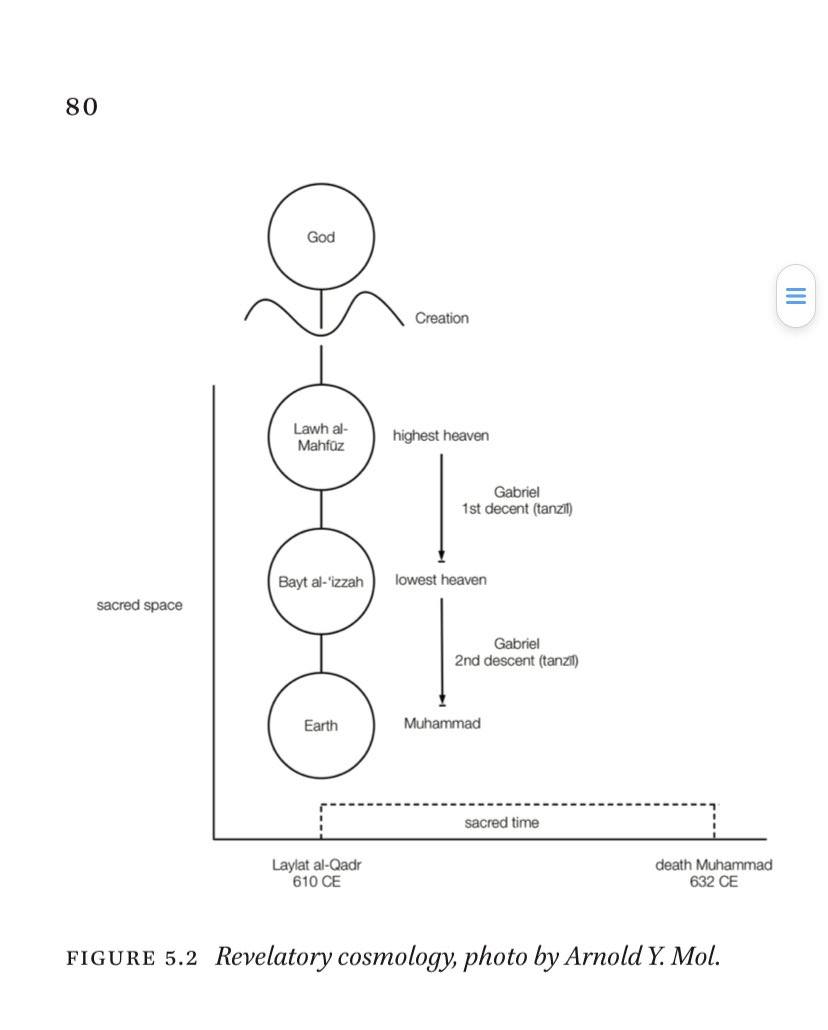
This is why the Quran (and other revelations) *are* directed and divinely controlled manifestations of divine speech within creation, but with letters and sounds, while divine speech itself doesn’t exist through letters or sounds (laysa min jins al-ḥurūf wa al-aṣwāt).
10/
10/
The complex discussion on the Quran being created or not (makhlūq aw ghayri makhlūq) is first of all part of a larger *cosmological* discussion, and not only one focused on divine attributes.
Back to our discussion on LQ!
11/
Back to our discussion on LQ!
11/
The Quran descends via the Angel Gabriel from the highest (Tablet) to the lowest metaphysical heaven, dimensions of the ʿālam al-ghayb (=*within* creation!), this first descend/sent down (1st tanzīl) is in *one piece* (jumla). Then it descends over 23 years to physical earth. 12/ 
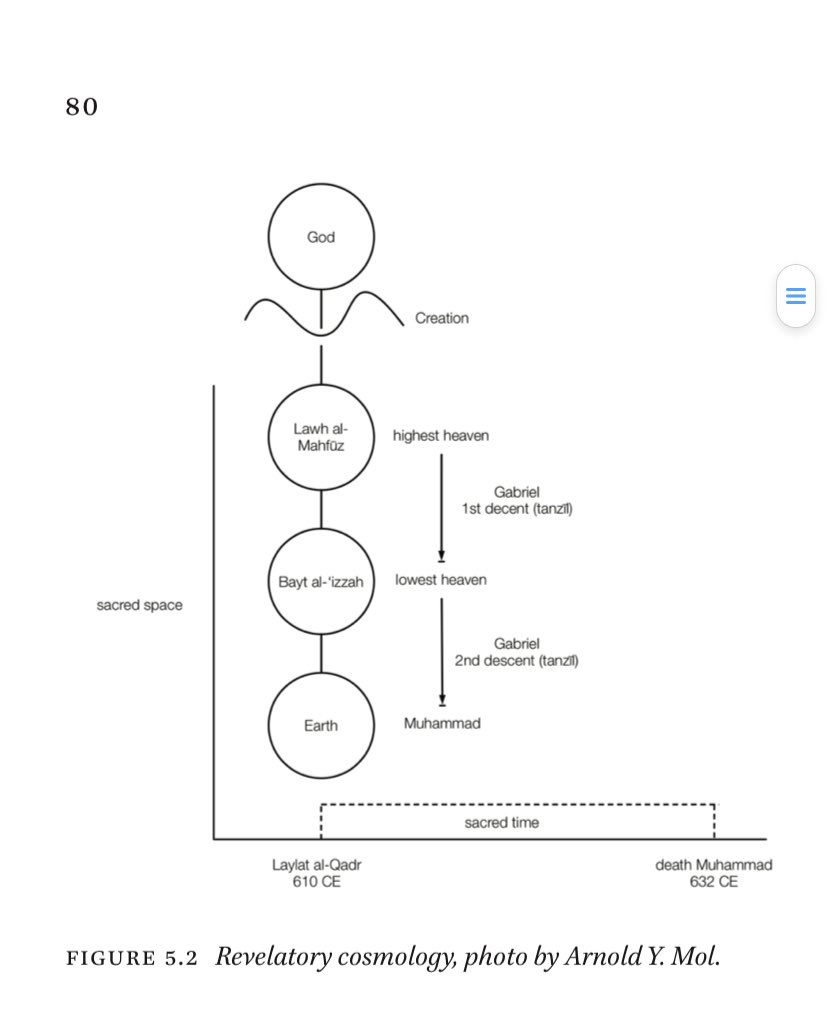
The Quran is in this second descend (2nd tanzīl) revealed, via Gabriel, piecemeal from the lowest metaphysical heaven to physical earth over a period of 23 years to the Prophet Muḥammad ﷺ. According to his and his context’s needs for guidance.
13/
13/
LQ is therefore understood in two ways:
1. LQ is when the Quran descends from the highest to the lowest metaphysical heavens (1st tanzīl).
2. And/Or, LQ is when the Quran descends from the lowest metaphysical heaven to physical earth to Muḥammad ﷺ (2nd tanzīl).
14/
1. LQ is when the Quran descends from the highest to the lowest metaphysical heavens (1st tanzīl).
2. And/Or, LQ is when the Quran descends from the lowest metaphysical heaven to physical earth to Muḥammad ﷺ (2nd tanzīl).
14/
This is why the Islamic tradition talks about *multiple* LQ’s in human sacred history (LQ’s that occur within metaphysical heavens, and LQ between metaphysical-physical worlds).
But LQ is not only about revelation, it is ALSO about destiny, qadr.
15/
But LQ is not only about revelation, it is ALSO about destiny, qadr.
15/
Qadr in Islamic theology is the concrete realization within creation of the divine decree (qaḍā). Qadr incorporates both what occurs due to imperative necessity (iḍṭirāriyya) and/or due to free will (ikhtiyāriyya).
See my sheets I use in my ʿAqīda classes @IURotterdam:
16/
See my sheets I use in my ʿAqīda classes @IURotterdam:
16/
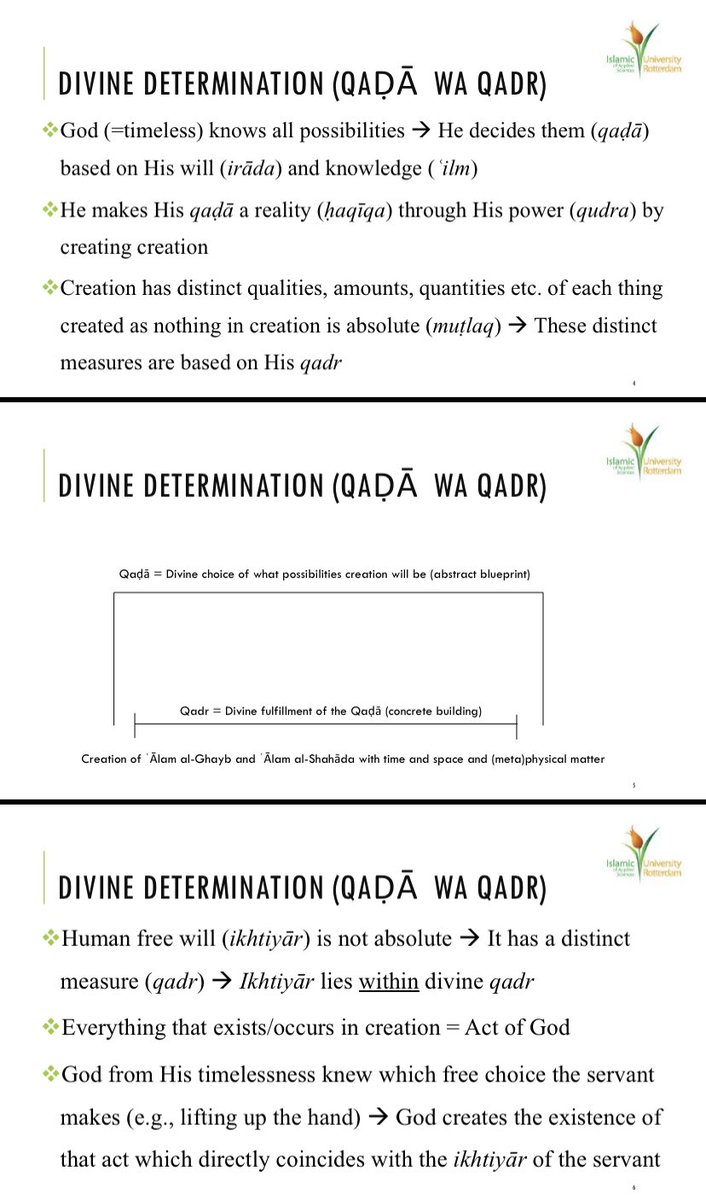
Everything occurs through divine decree (qaḍā), including the freely chosen acts by intelligent agents like humans (ikhtiyāriyya), these abstract forms will (irāda) expresses itself in creation (they become concrete/real) through divine Qadr.
17/
17/
Nothing is outside divine knowledge or control. There is no surprising the Creator, as He is outside time and space (created structures and limitations). But as our free will is expressed through Qadr, it means our Qadr (“destiny”) has a contextual side to it.
18/
18/
This is why it is stated that the Preserved Tablet describes our realities (ḥaqiqāt) *and* our possibilities (imkāniyya) for which we will be judged. We could have made better/worst free will choices which will testify against/for us on the Day of Judgement.
19/
19/
This Qadr combination of imperative necessity (iḍṭirāriyya) and free will (ikhtiyāriyya), this personal destiny, is *sent down* to each human each year during LQ as well.
So LQ is about sacred history (revelation) AND personal reality (destiny).
20/
So LQ is about sacred history (revelation) AND personal reality (destiny).
20/
So we have dealt with the theological concepts surrounding LQ. Now we simply have a logistical issue left: When is it? There are many seemingly conflicting traditions on its timing: During all the year, or several months, or first/middle/last part or uneven days of Ramadan.
21/
21/
So what is the solution in dealing with this multiplicity? The Islamic tradition emphasized 3 things:
1. Believers are judged by intention → You are responsible for searching LQ by spreading out repetitive worship and charity, you are *not* responsible for finding LQ.
22/
1. Believers are judged by intention → You are responsible for searching LQ by spreading out repetitive worship and charity, you are *not* responsible for finding LQ.
22/
2. 27th of Ramadan is the most accepted opinion, but LQ can be any night during Ramadan, even the whole year, as there were multiple Laylat al-Qadr’s in revelatory history. Sacred time as a metaphysical concept is *not* the same as physical time. There is not a clock for it.
23/
23/

As stated by al-Māturīdī in the above screenshot.
3. For the blessed seekers with the right conditions, according to a tradition from Ibn ʿAbbās, will know it is LQ because the night wasn’t hot or cold, and because at dawn the sun at sunrise has a weak red glow.
24/
3. For the blessed seekers with the right conditions, according to a tradition from Ibn ʿAbbās, will know it is LQ because the night wasn’t hot or cold, and because at dawn the sun at sunrise has a weak red glow.
24/
The multiplicity of LQ as revelational history (metaphysical sacred time), LQ as personal destiny (metaphysical ontology), LQ as a possible moment in present time (physical time), are all discussed in Sunnī exegeses of Sūrat al-Qadr (Q.97):
End/25


End/25
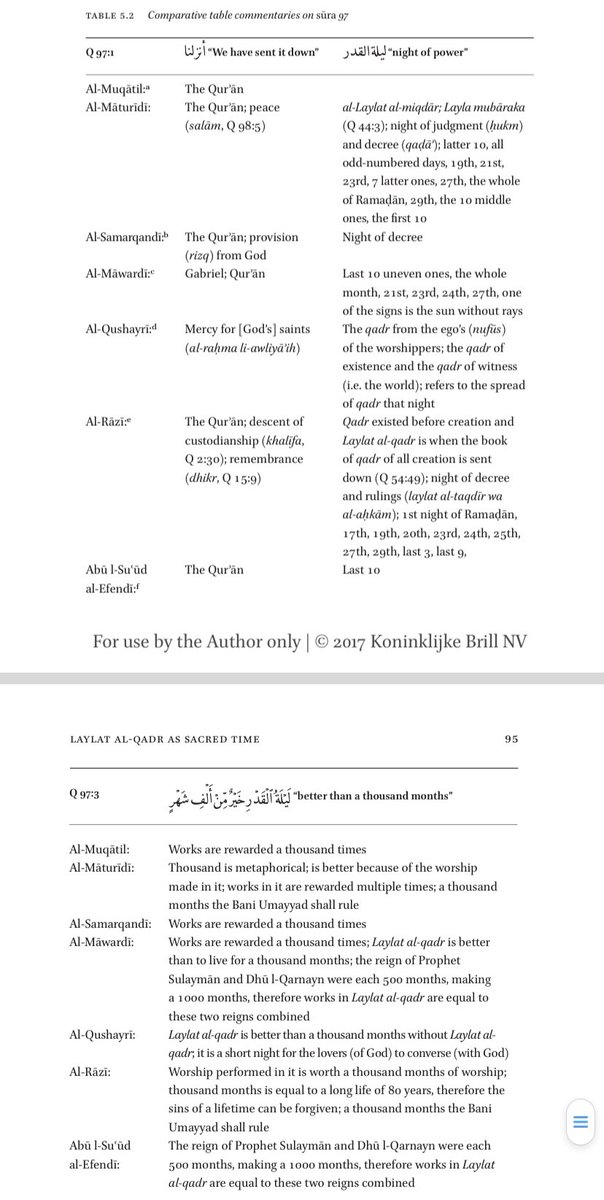
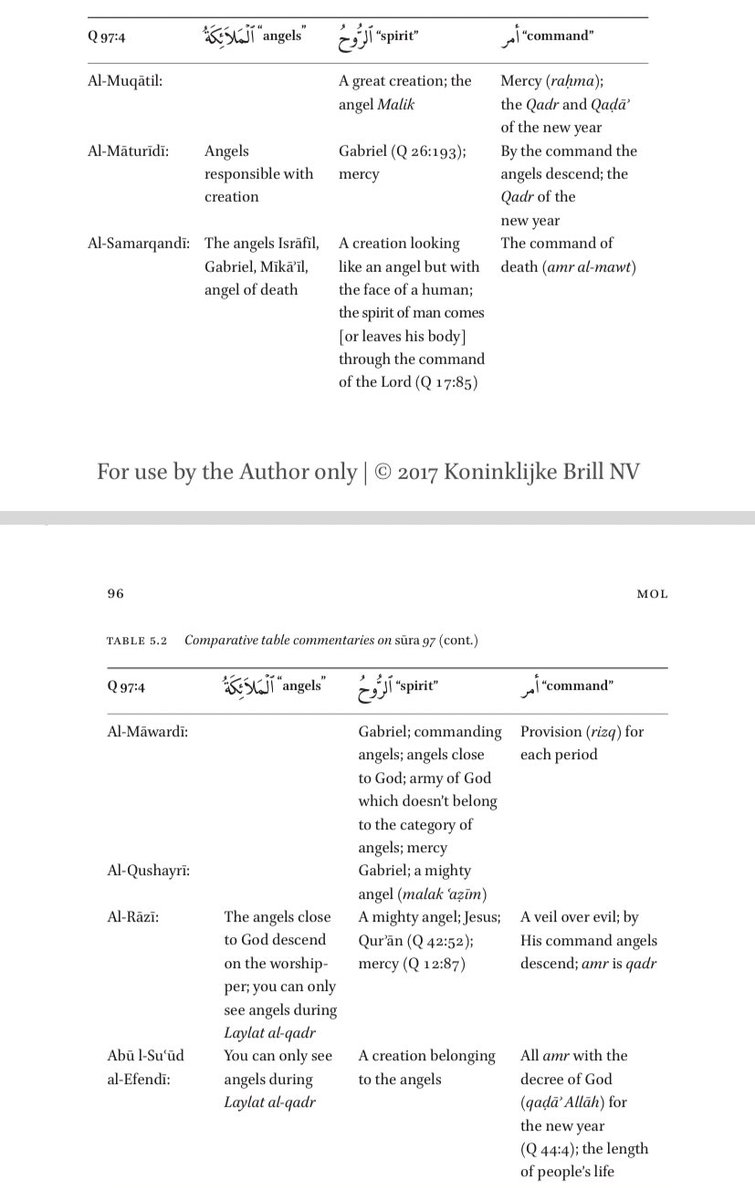
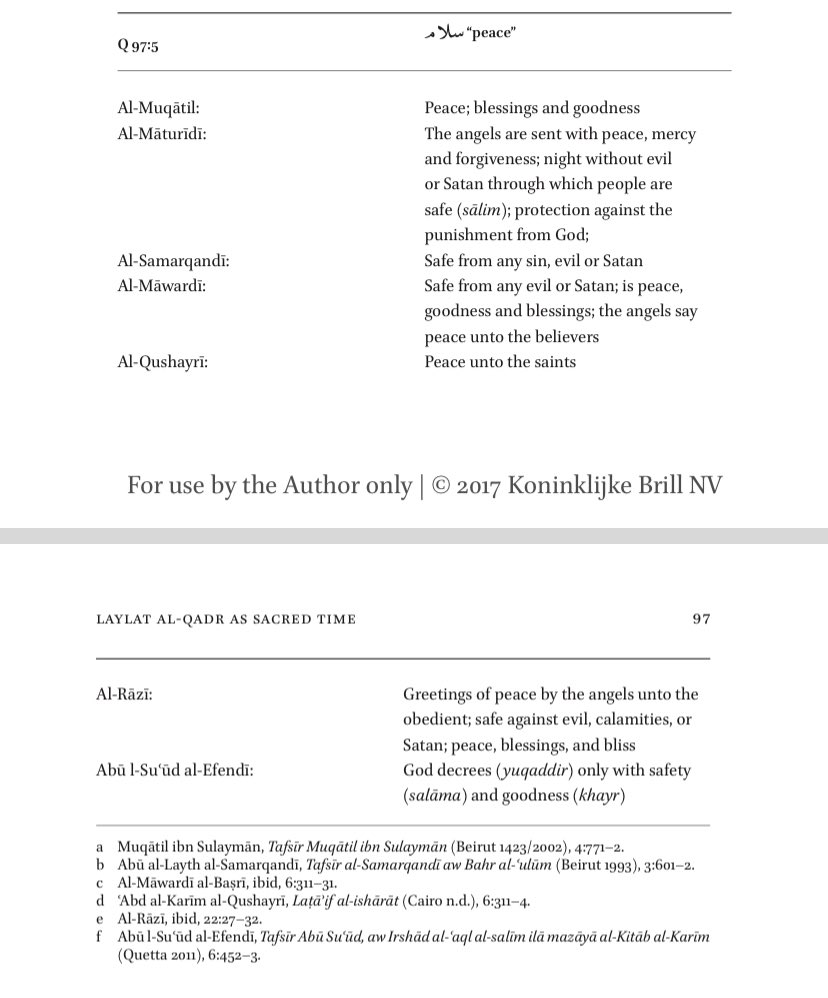
For the full research, with translation of al-Māturīdī’s exegesis on Sūrat al-Qadr, see my chapter:
"Laylat al-Qadr as Sacred Time: Sacred Cosmology in Sunnī Kalām and Tafsīr", Islamic Studies Today: Essays in Honor of Andrew Rippin (Leiden: Brill, 2017)
academia.edu/29695377/_Layl…
"Laylat al-Qadr as Sacred Time: Sacred Cosmology in Sunnī Kalām and Tafsīr", Islamic Studies Today: Essays in Honor of Andrew Rippin (Leiden: Brill, 2017)
academia.edu/29695377/_Layl…
• • •
Missing some Tweet in this thread? You can try to
force a refresh






